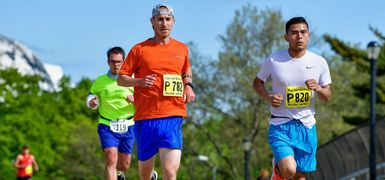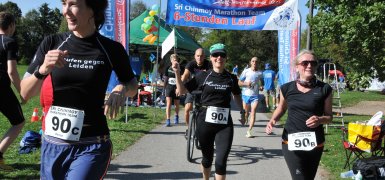An inspirational read: 26.2 Marathon Stories, by Kathrine Switzer and Roger Robinson
Anything you ever wanted to know about the mighty marathon race is in this book. If you have ever taken part in a marathon, running or supporting, you will find yourself compelled to keep reading chapter after chapter, as the topics roll from the history and first beginnings of the race, (which turns out to be somewhat fictional), to the ecstasy of the completion, with many stages in between; a total of 26.2, or 27, topics.
Nowadays, the health benefits of running are widely accepted and documented, but this knowledge is actually quite recent. A New York Times issue from 1909 declared,
"Every man who undertakes the running of 26 miles weakens his heart and shortens his life. For the great majority of adults particularly in an urban population, to take part in a Marathon race is to risk serious and permanent injury to health, with immediate death a danger not very remote."
The popularity and acceptance of marathon running actually only began in the 1960's. One of the instigators was the great New Zealand running coach, Arthur Lydiard, who wrote a landmark book called 'Run for Your Life'. He maintained that running was good for everybody, and his philosophy produced astounding results, particularly with post-cardiac patients.
Some of the scientifically proven side effects of running quoted from 26.2 Marathon Stories are;
"By strengthening the heart, running reduces the rate of heart disease. By pumping oxygen and antioxidants, it combats carcinogenic free radicals, and so reduces the incidence of many forms of cancer...it diminishes lingering toxins. By raising body temperature to fever level on a daily basis, it burns out infection. By stimulating sweating and increasing breath exchange, it eliminates toxins via the skin and expelled air. By releasing adrenaline, it flushes the system with disease-fighting white blood cells and immune substances. By reducing body weight, it counters the effects of obesity- stress on the heart, joints, lungs and muscles, and non-insulin dependant diabetes. By stimulating endorphins, it alleviates stress, counters depression, and enhances creativity and problem solving. By strengthening bones, it radically reduces the incidence of osteoporosis...finally, by leaving the body fulfilled and tired, running helps maintain healthy sleep patterns."
One chapter entitled 'motivations' quotes many well-known, and some unknown, runners;
"If you want to run, run a mile. If you want to experience another life, run a marathon'
- Emil Zatopek.
"There are only three winners: the one who competes with himself, the one who crosses the finish line first, and the one who finishes the race'
- Sri Chinmoy, The Outer Running and Inner Running.
"We run, not because we think it is doing us good, but because we enjoy it and cannot help ourselves. It also does us good because it helps us to do other things better. It gives a man the chance to bring out power that might otherwise remain locked away inside himself. The urge to struggle lies latent in everyone"
- Roger Bannister, FIRST FOUR MINUTES.
"I started running at age 72 because I was tired of all the boring talk about funerals"
- Ruth Rothfarb (who ran her first marathon at age 81)
26.2 Marathon Stories tells of the fight for women to race, which Kathrine Switzer brought to world attention in 1967 when she broke the rules by running the then 'males only' Boston Marathon. Today nearly half of the marathon runners are, in fact, women.
Many great running heroes are documented, giving great inspiration to the reader, however the focus is well balanced between the elite athletes and the millions of people around the world who bravely take up the challenge, experience the struggles, and are left with that unmatchable feeling of the completion of the race. A highly recommendable read for all aspiring marathon runners and non runners alike.



